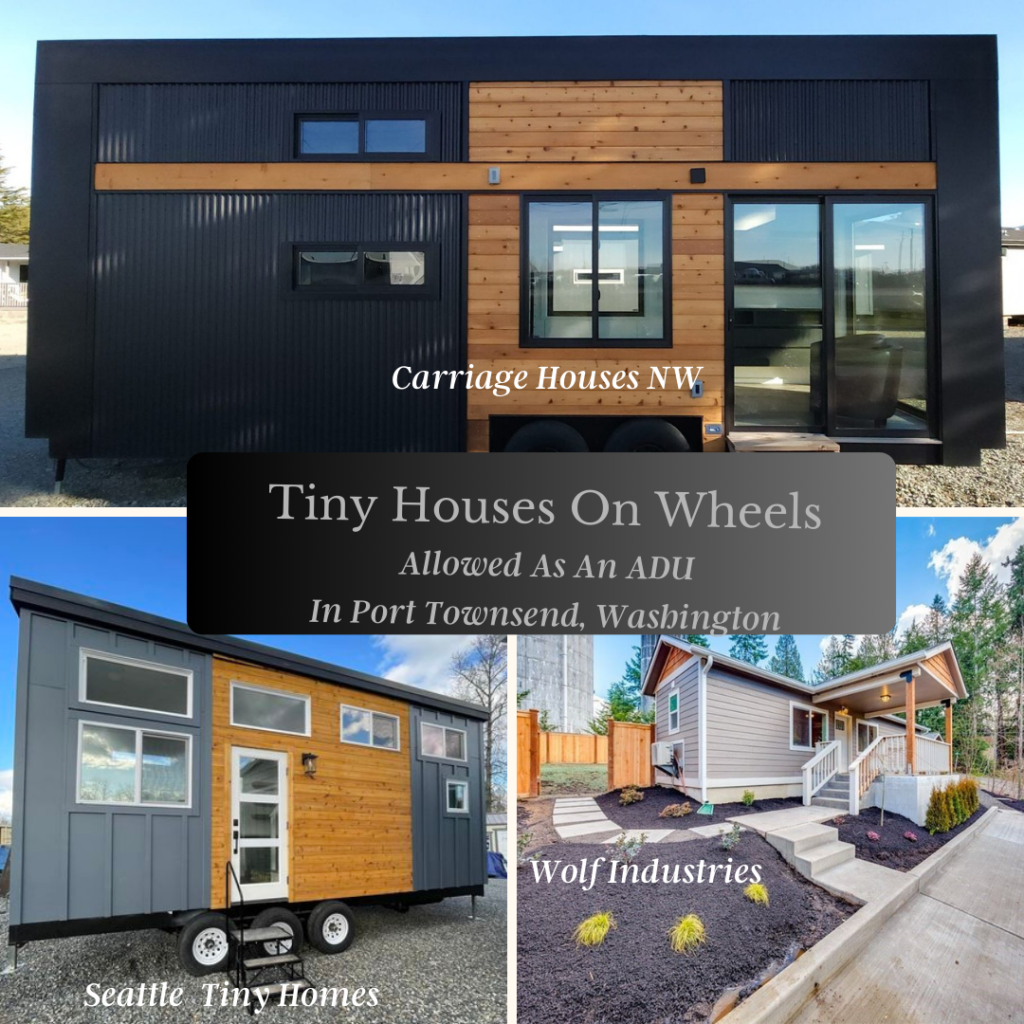Port Townsend Progresses Tiny Houses On Wheels
Source- City Of Port Townsend, Wa; Starting on July 1, 2023, per Ordinance 3306, Tiny Houses on Wheels (THOWs) will be permitted as Accessory Dwelling Units (ADU), subject to the requirements of Port Townsend Municipal Code 17.58.030.
An ADU is a dwelling unit that is accessory to an existing primary residence.
This document is specific to THOWs as ADUs, where up to 2 THOWs may be placed on a lot with an existing
single-family residence. For information on how to establish a Tiny House on Wheels Community with up
to 12 THOWs, please see our THOW Community handout. For general information about ADUs, please see
our ADU handout.
These handouts and any additional THOW forms and documents are located at:
THOW Definitions, Requirements, and Permitting
1) WHAT IS A THOW?
THOW is shorthand for a “Tiny House on Wheels”. Depending on who you talk to, THOW can refer to a
variety of structures so it is important to know what types of structures are permitted as THOWs in Port
Townsend.
Per PTMC 17.58, a THOW is defined as a structure no larger than 400 square feet, excluding loft space,
that meets the following conditions:
• Is licensed and registered with the Department of Motor Vehicles;
• Is constructed and certified to building and inspections standards in PTMC 17.58.030;
• Is no larger than allowed for movement on public highways;
• Has at least 150 square feet of first floor living space and does not exceed 16 feet in height;
• Is a detached self-contained unit which includes areas for cooking, sleeping, and sanitation.
A THOW as described above is technically a Park Model Recreational Vehicle, which is a factory-built
structure or dwelling constructed to ANSI standards (not State Building Codes) and is certified through
the Washington Department of Labor and Industries (L&I). Since Park Models are typically designed for
temporary or recreational use, THOWs in Port Townsend will be required to meet additional
construction standards on top of Park Model standards to increase energy efficiency and be suitable for
all-year, day-to-day use as a dwelling.
Buyer beware: Not all structures advertised as “tiny homes”, “tiny houses on wheels” or “park models”
meet the requirements to be established as a THOW in Port Townsend. THOWs that do not meet Port
Townsend’s requirements are
2) WHO REGULATES THOWS?
The Washington Department of Labor and Industries (L&I) regulates the construction of Park Model RVs
(and other factory-built structures), while the City of Port Townsend’s Department of Planning and
Community Development regulates the placement and use of these units within city limits.
NOTE: Please be aware that the State of Washington and City of Port Townsend do not define tiny
houses on wheels the same way. According to the State of Washington, a Park Model RV is not a “tiny
house” but is instead considered a type of recreational vehicle. The State defines a THOW or tiny house
as meeting State Building Code requirements, which Park Models do not. More information:
https://lni.wa.gov/licensing-permits/_docs/TinyHomeTinyHouse.pdf?language_id=1.
The difference between Washington State Code and Port Townsend Municipal Code does not prevent
someone from establishing a Park Model THOW in Port Townsend; however, it does mean that different
terminology may apply when talking to L&I or the City. Tips for when to use the term Park Model or
Tiny House are provided later in this document.
3) WHERE ARE THOW ADUs PERMITTED IN THE CITY OF PORT TOWNSEND?
In the City of Port Townsend, THOWs may be permitted as ADUs in R-I, R-II, and R-III zones subject to the
provisions of Section 17.16.020 PTMC:
Refer to the City’s zoning map to determine the zone for a specific property and verify it is within the
city limits:
For properties outside the city limitsplease contact Jefferson County Department of Community Development at 360-379-4450 or dc*@co.us
A THOW ADU cannot be placed on a property that does not already have an existing single-family residence, as the THOW must be accessory to a primary residence. A Restrictive Covenant is required when the property has more than one lot and the THOW will be placed on an adjacent lot, across property lines, or does not meet minimum setbacks.The Restrictive Covenant will bind the THOW to the existing single-family residence. The applicant must pay for the staff time required to record the document with the Jefferson County Auditor’s office and pay all recording fees.
FAQ: Tiny Houses On Wheels (THOWs) as Accessory Dwelling Units in the City of Port Townsend
Related Blog Post
Washington State Builders L& Industries Approved
Tiny House Alliance USA Editor
August 3, 2023 The Future Of Tiny Is Now!
Janet Thome Founder And President
ja***@ti******************.org
509 345 2013


